
On the occasion of Black History Month UK, we speak to Lynda Chinaka, Senior Lecturer in Computing in Education at the University of Roehampton, about her experiences in computing education, her thoughts about underrepresentation of Black students in the subject, and her ideas about what needs to be done to engage more Black students.
Lynda, to start us off, can you share your thoughts about Black History Month?
Black history is a really important topic, obviously, and I think that, when Black History Month was first introduced, it was very powerful — and it continues to be in certain places. But I think that, for where we are as a society, it’s time to move past talking about Black history for only one month of the year, albeit an important, focused celebration. And certainly that would include integrating Black history and Black figures across subjects in school. That would be a very useful way to celebrate the contributions that Black people have made, and continue to make, to society. Children need to be taught a history in which they are included and valued. Good history is always a matter of different perspectives. Too often in schools, children experience a single perspective.
Please tell me a bit about your own history: how did you come to computing education as a field? What were the support or barriers you encountered?
In terms of my journey, I’ve always been passionate about Computing — formerly ICT. I’ve been a Computing subject lead in schools, moving on into senior management. Beyond my career in schools, I have worked as an ICT consultant and as a Teacher Leader for a London authority. During that time, my interest in Computing/ICT led me to undertake an MA in Computing in Education at King’s College London. This led me to become a teacher trainer in my current role. In some sense, I’m carrying on the work I did with the local authorities, but in a university setting. At the University of Roehampton, I teach computing to BA Primary Education and PGCE students. Training teachers is something that I’m very much interested in. It’s about engaging student teachers, supporting them in developing their understanding of Computing in the primary phases. Students learn about the principles of computing, related learning theories, and how children think and learn. Perhaps more importantly, I am keen to instil a love of the subject and broaden their notions about computing.
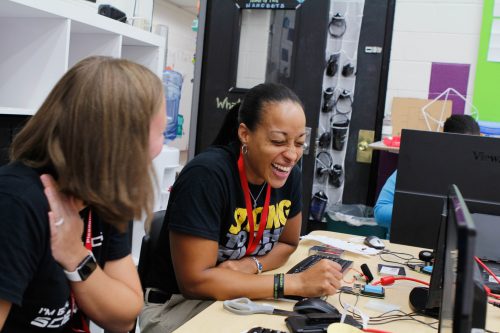
In terms of the support I’ve received, I’ve worked in certain schools where Computing was really valued by the Headteacher, which enabled me to promote my vision for the subject. Supportive colleagues made a difference in their willingness take on new initiatives that I presented. I have been fortunate to work in local authorities that have been forward-thinking; one school became a test bed for Computing. So in that sense, schools have supported me. But as a Black person, a Black woman in particular, I would say that I faced barriers throughout my career. And those barriers have been there since childhood. In the Black community, people experience all sorts of things, and prejudice and barriers have been at play in my career.
Prejudice sometimes is very overt. An example I think I can share because it prevented me from getting a job: I went for an interview in a school. It was a very good interview, the Headteacher told me, “It was fantastic, you’re amazing, you’re excellent,” the problem was that there weren’t “enough Black pupils”, so she “didn’t see the need…”. And this is a discussion that was shared with me. Now in 2021 a Headteacher wouldn’t say that, but let’s just wind the clock back 15 years. These are the kinds of experiences that you go through as a Black teacher.
So what happens is, you tend to build up a certain resilience. People’s perceptions and low expectations of me have been a hindrance. This can be debilitating. You get tired of having to go through the same thing, of having to overcome negativity. Yes, I would say this has limited my progress. Obviously, I am speaking about my particular experiences as a Black woman, but I would say that these experiences are shared by many people like me.
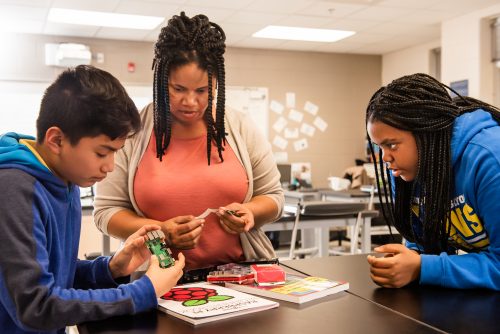
But it’s my determination and the investment I’ve made that has resulted in me staying in the field. And a source of support for me is always Black colleagues, they understand the issues that are inherent within the profession.
Black students are underrepresented in Computing as a subject. Drawing on your own work and experiences, could you share your thoughts about why that’s the case?
There need to be more Black teachers, because children need to see themselves represented in schools. As a Black teacher, I know that I have made a difference to Black children in my class who had a Black role model in front of them. When we talk about the poor performance of Black pupils, we need to be careful not to blame them for the failures of the education system. Policy makers, Headteachers, teachers, and practitioners need to be a lot more self-aware and examine the impact of racism in education. People need to examine their own policies and practice, especially people in positions of power.
A lot of collective work needs to be done.
Lynda Chinaka
Some local authorities do better than others, and some Headteachers I’ve worked with have been keen to build a diverse staff team. Black people are not well-represented at all in education. Headteachers need to be more proactive about their staff teams and recruitment. And they need to encourage Black teachers to go for jobs in senior management.
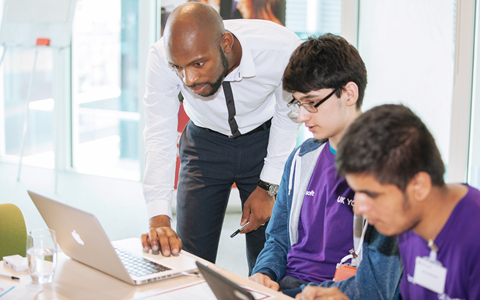
In all settings I taught in, no matter how many students of colour there were, these students would experience something in my classroom that their white counterparts had experienced all their lives: they would leave their home and come to school and be taught by someone who looks like them and perhaps speaks the same language as them. It’s enormously affirming for children to have that experience. And it’s important for all children actually, white children as well. Seeing a Black person teaching in the classroom, in a position of power or influence — it changes their mindset, and that ultimately changes perspectives.
So in terms of that route into Computing, Black students need to see themselves represented.
Why do you think it’s important to teach young people about Computing?
It’s absolutely vital to teach children about Computing. As adults, they are going to participate in a future that we know very little about, so I think it’s important that they’re taught computer science approaches, problem solving and computational thinking. So children need to be taught to be creators and not simply passive users of technology.
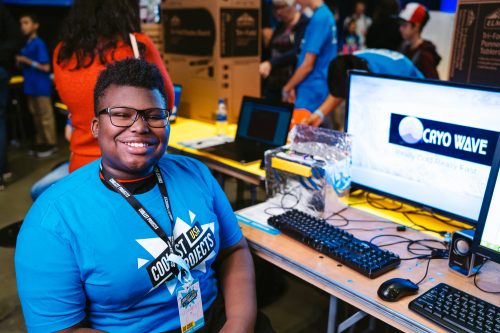
One of the things some of my university students say is, “Oh my goodness, I can’t teach Computing, all the children know much more than me.”, but actually, that’s a little bit of a myth, I think. Children are better at using technologies than solving computing problems. They need to learn a range of computational approaches for solving problems. Computing is a life skill; it is the future. We saw during the pandemic the effects of digital inequity on pupils.
What do you think needs to change in computing education, the tech sector, or elsewhere in order to engage more Black students in Computing?
In education, we need to look at the curriculum and how to decolonise it to really engage young people. This also includes looking out for bias and prejudice in the things that are taught. Even when you’re thinking about specific computer science topics. So for example, the traditional example for algorithm design is making a cup of tea. But tea is a universal drink, it originates in China, and as a result of colonialism made its way to India and Kenya. So we drink tea universally, but the method (algorithm) for making tea doesn’t necessarily always include a china tea pot or a tea bag. There are lots of ways to introduce it, thinking about how it’s prepared in different cultures, say Kenya or the Punjab, and using that as a basis for developing children’s algorithmic thinking. This is culturally relevant. It’s about bringing the interests and experiences children have into the classroom.
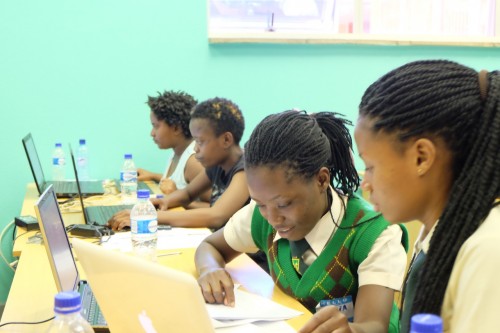
For children to be engaged in Computing, there needs to be a payoff for them. For example, I’ve seen young people developing their own African emojis. They need to see a point to it! They don’t necessarily have to become computer scientists or software engineers, but Computing should be an avenue that opens for them because they can see it as something to further their own aims, their own causes. Young people are very socially and politically aware. For example, Black communities are very aware of the way that climate change affects the Global South and could use data science to highlight this. Many will have extended family living in these regions that are affected now.
So you don’t compromise on the quality of your teaching, and it require teachers to be more reflective. There is no quick fix. For example, you can’t just insert African masks into a lesson without exploring their meaning in real depth within the culture they originate from.
So in your Computing or Computer Science lessons, you need to include topics young people are interested in: climate change, discrimination, algorithms and algorithmic bias in software, surveillance and facial recognition. Social justice topics are close to their hearts. You can get them interested in AI and data science by talking about the off-the-shelf datasets that Big Tech uses, and about what impact these have in terms of surveillance and on minority communities specifically.
Can you talk a bit about the different terms used to describe this kind of approach to education, ‘culturally relevant teaching’ and ‘decolonising the curriculum’?
‘Culturally relevant’ is easier to sit with. ‘Decolonising the curriculum’ provokes a reaction, but it’s really about teaching children about histories and perspectives on curricula that affect us all. We need to move towards a curriculum that is fit for purpose where children are taught different perspectives and truth that they recognise. Even if you’re in a school without any Black children at all, the curriculum still needs to be decolonised so that children can actually understand and benefit from the many ways that topics, events, subjects may be taught.
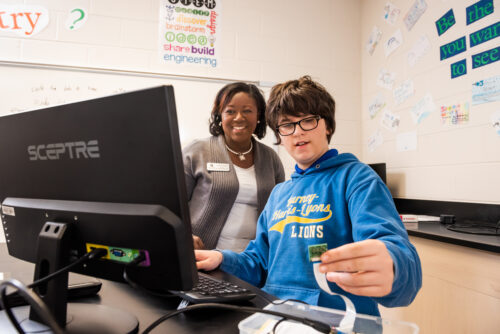
When we think about learning in terms of being culturally relevant and responsive, this is about harnessing children’s heritage, experiences, and viewpoints to engage learners such that the curriculum is meaningful and includes them. The goal here is to promote long-term and consistent engagement with Computing.
What is being missed by current initiatives to increase diversity and Black students’ engagement?
Diversity initiatives are a good step, but we need to give it time.
The selection process for subjects at GCSE can sometimes affect the uptake of computing. Then there are individual attitudes and experiences of pupils. It has been documented that Black and Asian students have often been in the minority and experience marginalisation, particularly noted in the case of female students in GCSE Computer Science.
ITE (Initial Teacher Education) providers need to consider their partnerships with schools and support schools to be more inclusive. We need more Black teachers, as I said. We also need to democratise pathways for young people getting into computing and STEM careers. Applying to university is one way — there should be others.
Schools could also develop partnerships with organisations that have their roots in the Black community. Research has also highlighted discriminatory practices in careers advice, and in the application and interview processes of Russell Group universities. These need to be addressed.
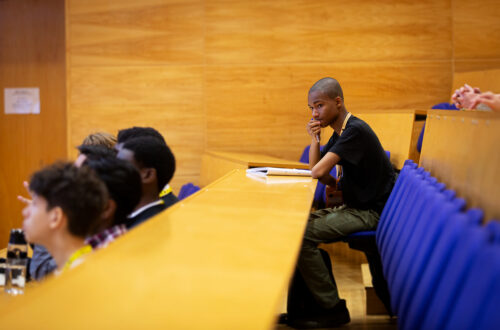
There are too few Black academics at universities. This can have an impact on student choice and decisions about whether to attend an institution or not. Institutions may seem unwelcoming or unsympathetic. Higher education institutions need to eliminate bias through feedback and measuring course take-up.
Outside the field of education, tech companies could offer summer schemes, short programmes to stimulate interest amongst young Black people. Really, the people in leadership positions, all the people with the power, need to be proactive.
A lot of collective work needs to be done. It’s a whole pipeline, and everybody needs to play a part.
What in your mind is a key thing right now that people in computing education who want to engage more Black students should do?
You can present children with Black pioneers in computing and tech. They can show Black children how to achieve their goals in life through computing. For example, create podcasts or make lists with various organisations that use data science to further specific causes.
It’s not a one-off, one teacher thing, it’s a project for the whole school.
Lynda Chinaka
Also, it’s not a one-off, one teacher thing, it’s project for the whole school. You need to build it into a whole curriculum map, do all the things you do to build a new curriculum map: get every teacher to contribute, so they take it on, own it, research it, make those links to the national curriculum so it’s relevant. Looking at it in isolation it’s a problem, but it’s a whole school approach that starts as a working group. And it’s senior management that sets the tone, and they really need to be proactive, but you can start by starting a working group. It won’t be implemented overnight. A bit like introducing a school uniform. Do it slowly, have a pilot year group. Get parents in, have a coffee evening, get school governors on board. It’s a whole staff team effort.
People need to recognise the size of the problem and not be discouraged by the fact that things haven’t happened overnight. But people who are in a position of influence need to start by having those conversations, because that’s the only way that change can happen, quite frankly.
Lynda, thank you for sharing your insights with us!
Lynda was one of the advisors in the group we worked with to create our recently published, practical guide on culturally relevant teaching. You can download it as a free PDF now. We hope it will help you kickstart conversations in your setting.
Website: LINK
